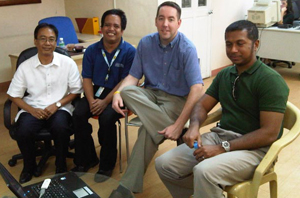Center for Persons with Disabilities (UT UCEDD/LEND) provides consultations in disaster preparedness, employment, and web accessibility in Phillipines
February 1, 2010

|
| Cromwell Taduran and Rodolfo Nolasco of the Nova Foundation met with Jeff Sheen and Sachin Pavithran of the Center for Persons with Disabilities |
A three-member team of CPD employees went to the Philippines with a plan to spread expertise and training both in that country and worldwide. The CPD team included Training and Development Specialist Jeff Sheen, CPD Associate Interdisciplinary Training Division Director Marilyn Hammond, and Assistive Technology Specialist Sachin Pavithran.
Their hope is to build relationships that will eventually improve the lives of people with disabilities in different developing countries. Their vision includes cooperating with respected and established disability organizations in other parts of the world.
The National Council of Disability Affairs, a government organization in the Philippines, has asked the group to provide training and technical assistance in a number of areas inlcuding disaster preparedness, employment, and web accessibility. The CPD group is now seeking funding to make it happen.
In addition, they spent an hour with about 15 representatives of the Asian Development Bank, an international development finance institution dedicated to fighting poverty. This was the CPD's second presentation to the ADB, during which they spoke of the connections between disability, unemployment and poverty.
Along the way, the CPD team met with representatives of the Christian Blind Mission and the Nova Foundation for Differently Abled Persons, two organizations operating in the Philippines and enjoying remarkable success. "It was an excellent opportunity to discuss approaches, and a learning experience for us," said Dr. Hammond.
Sheen agreed. The Nova Foundation, established in the Philippines by the Nova Management Corporation, trains and employs people with disabilities to do computer encoding work. So far it has trained 450 people and placed 261 of them in jobs, Sheen said-results that exceed those of many other, better-funded programs. "They're just real people doing what they can with what they can scrape together."
Likewise, the Christian Blind Mission has established a strong curriculum and firm relationships with the communities it serves. The worldwide organization currently helps people with a broad spectrum of disabilities. "We learned a lot of great strategies that could be used here," Sheen said. "They work so well and so closely with the local government unit. ... They go in with this mindset of creating ownership."
Team members also met with representatives of the National Council of Disability Affairs and the Church of Jesus Christ of Latter-Day Saints' Humanitarian Services, which have a partnership to distribute wheelchairs to people who need them. Since 2001, the humanitarian services of the LDS Church have distributed more than a quarter of a million wheelchairs in more than 100 countries. An estimated 60 million people in the world who need wheelchairs do not have one.
The three CPD representatives are currently volunteering their time to co-write a curriculum that would introduce wheelchair recipients to the possibilities of employment training, identifying their strengths and thinking of career opportunities. This curriculum has been a cooperative effort between the team, another volunteer and a representative of LDS Humanitarian Services.
After some further refinement and field testing, it is hoped that the LDS Humanitarian Services will adopt the curriculum in the Philippines and the 100 other countries where the wheelchair donation program is in place.







